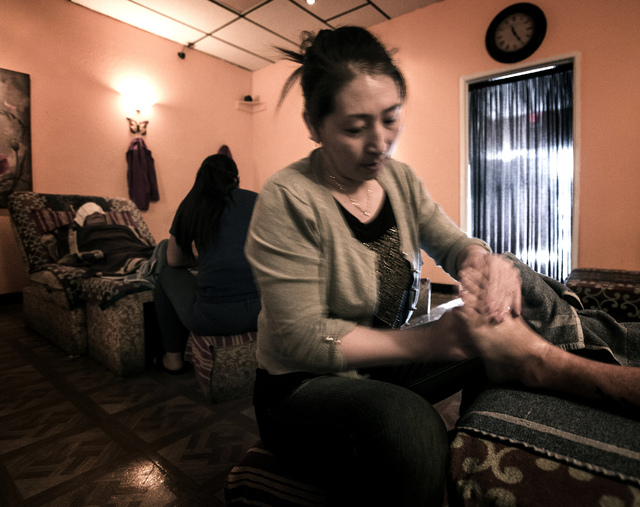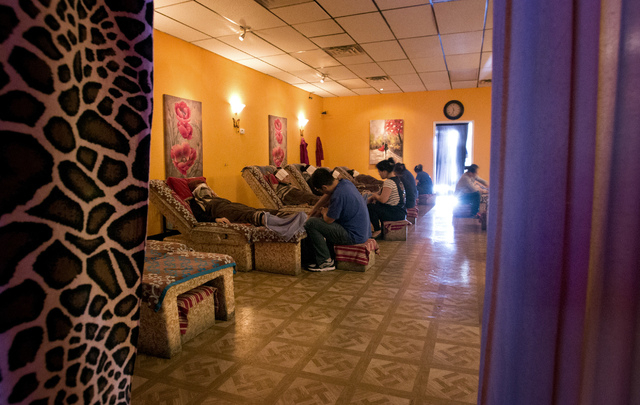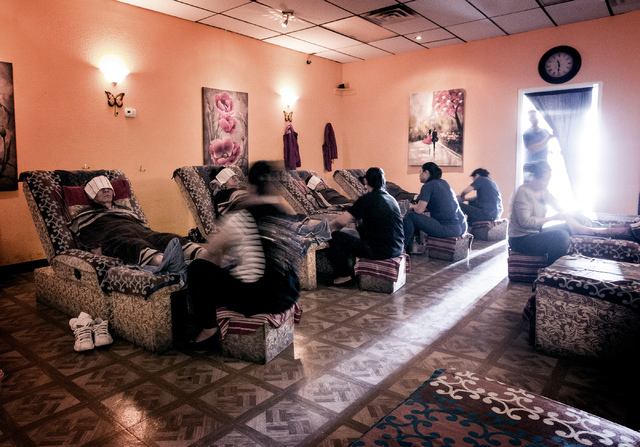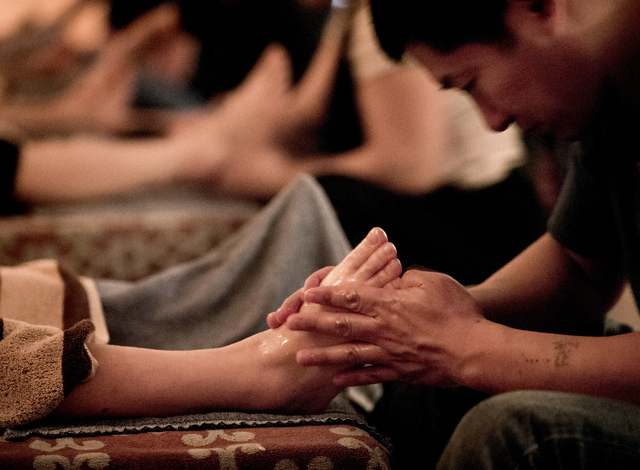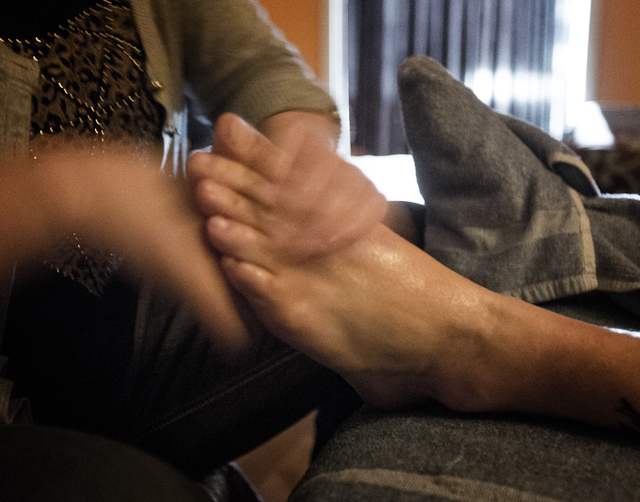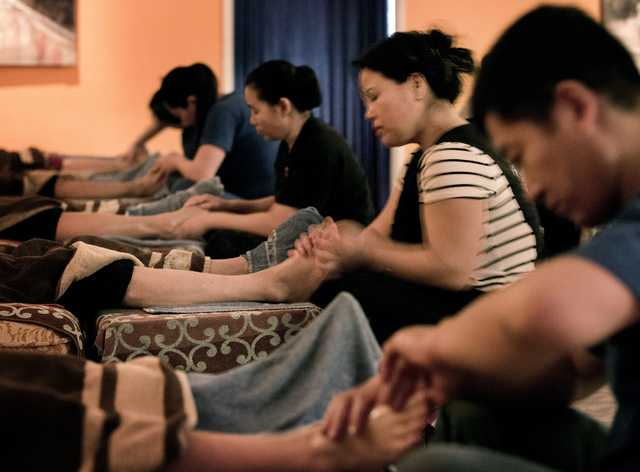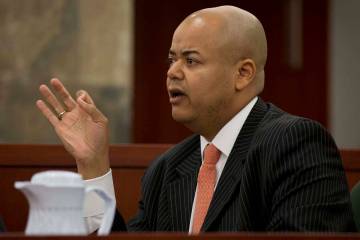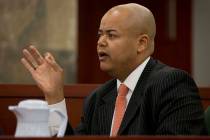Reflexologists say rules proposed in Clark County hurt business
At Happy Feet, 10 reflexologists rub patrons’ feet and hands in an open room.
A video monitor captures the activity, which owner Dina Han can watch from the reception area.
Han opened the reflexology business a couple of blocks from The Orleans in 2012. Now, she worries that a proposed ordinance will force her and the 10 reflexologists at Happy Feet out of business. She is concerned the proposal would cost her business that comes in late at night, much of it from casino workers after their shifts end.
Clark County officials are concerned that without regulations, illegitimate operators will pose as reflexologists to avoid the more stringent existing requirements to open a massage parlor. Both massage parlors and reflexology businesses have a reputation in the valley as potential places where prostitution can happen.
The Las Vegas City Council in December 2011 tightened regulations for reflexology clinics and massage parlors to combat trafficking.
Reflexologists have to get a county business license but one without any required training or background checks.
Reflexologists provide foot, hand and ear rubs based on the concept that they stimulate reflexes that benefit the body as a whole, providing overall benefits such as boosted circulation and an improved immune system.
The county’s proposal would institute training requirements for certification and restrict the hours of operation for such businesses.
More than 1,000 people in Clark County are reflexologists, according to county estimates.
The proposal is intended partly to keep unscrupulous operators from calling themselves reflexologists to avoid the county’s tighter regulations of massage parlors.
The county’s proposal has drawn a mixed reaction from the reflexology industry that includes support for the possible changes and concerns about the effect on business.
Specifically, the proposed licensing requirements would restrict hours of operation to 8 a.m. to midnight, and require new reflexologists applying for a license to have completed a course of study with at least 110 hours of instruction and 90 hours of practicum — hands-on training — or received a certification from an independent national reflexology testing entity.
Reflexologists would have to complete at least six hours of continuing education annually. The county ordinance proposal is flexible on the school and where reflexologists can prepare for their careers, with no requirement to attend a specific, identified institution.
Happy Feet is open 11 a.m. to 1 a.m. daily. Han said limiting the hours and forcing her to close early would hurt business and her plans to expand into a 24-hour operation.
“What we’re doing is soothing people’s nerves,” she said. “Our main purpose is helping people.”
Reflexologists who already have business licenses in the county wouldn’t have to get background checks or complete the full training requirement, but they would still have to complete six hours of continuing education each year. New reflexologists would need a background check.
Under the proposal, certified reflexologists would be able to touch patrons only on the arms below the elbows to the hands, on the legs below the knees to the feet, and on the outer ears. They would also be required to work in an unenclosed room or an enclosed room with an interior window.
The ordinance also would forbid lewd activities, working topless, and the solicitation of sexual favors. Reflexologists also would be required to wear nontransparent, opaque clothes.
County Commissioner Chris Giunchigliani, who is proposing the changes with Commissioner Mary Beth Scow, said the measure would close loopholes that surrounding jurisdictions have addressed.
“I think there’s justification for making sure they’re fairly regulated because no one has any training per se,” she said. “Just to call yourself a reflexologist — what does that mean?”
Noting that there are bad actors in any legitimate industry, she said the proposal would give a skill set to properly licensed reflexologists and is intended to help, not hinder legitimate business operators in the industry.
Though the proposal would limit a business’s hours of operation, a reflexology establishment could apply for a special use permit to waive that requirement.
The city of Las Vegas already has similar regulations for reflexologists, which include background checks, 110 hours of training from an accredited school or a certification from an independent, national testing entity.
Reflexology businesses can be open from 6 a.m. to 10 p.m. in the city, closing up shop two hours earlier than the midnight time in the county proposal.
Han also worries that the training requirements will add financial hardship to workers. In her case, they are Chinese immigrants who face language barriers and are hoping for a better life in the United States. Customers pay $20 for a one-hour session, which is split between her business and the reflexologist, who gets $10 for the hour, plus tips.
“I’m just trying to make my own American dream,” said Art Tien, 28, a reflexologist who made his way from China to Los Angeles and then Las Vegas.
Many of these workers have learned reflexology in China before moving to Las Vegas. The proposed ordinance doesn’t specify individual schools for training and would give the county flexibility in determining whether a training program meets its requirements.
Others in the industry support a training requirement.
Nathan O’Hara, academic director of the Fu Zu Ba School of Massage and Reflexology in Las Vegas, said training for the work is necessary preparation.
“It’s the art and science of using points on the feet, hands and outer ears to improve the health on various parts of the body,” O’Hara said. “The concept is that every structure and organ in the body has a related reflex point on the feet, hands and outer ears.”
That concept has roots in China that date back some 4,000 years.
O’Hara said a training requirement would help the industry.
“There are just a tremendous number of reflexology shops,” he said. “Some of them are truly reflexology and some of them are people that really haven’t had much, if any, training.”
“I think in terms of public safety in terms of hygiene, people need to know what they’re doing,” O’Hara said. “It’s not that complex, but if someone hasn’t had any training, then it’s not too good.”
Nevada Reflexology Organization President JoAnn Welland said it’s important that the public understands what reflexology is.
It’s not to be confused with massages and massage therapy, she said, and is a science that deals with the principle that reflex areas on the feet and hands correspond with all the glands, organs and other parts of the body.
It’s also neither a substitute for clinical medical treatment nor a treatment for any specific illnesses, she said. It helps the body relax and improves circulation.
Welland expressed support for a training requirement for reflexologists.
The County Commission will face a decision on the proposal in February.
Contact reporter Ben Botkin at bbotkin@reviewjournal.com or 702-405-9781. Follow him on Twitter @BenBotkin1.



